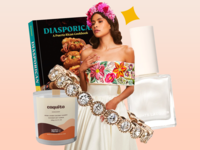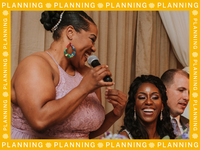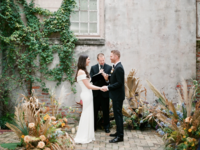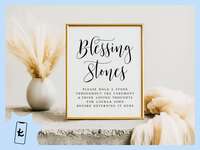How We Honored Our Latinx Roots at Our Wedding


I was living my best single life in Echo Park, doing weekly karaoke at a local old-school Mexican restaurant and partying like it was 1999, when my friend and roommate took it upon herself to set me up with her co-worker's best friend. She was sick of me dating losers and liked his MySpace page (it was 2007). After seven months of putting off a blind date, I finally obliged and fell hard for someone who actually had his shit together.
Rolando was Chicanx like me and grew up in El Sereno, just seven miles from my childhood home in South San Gabriel. Our parents were both born and raised in East LA and frequented the same Thrifty and hotdog stand back in the day. He was doing his residency to become a family medicine doctor and I was a budding journalist. He wore a Mexican amber necklace from Chiapas, where I had traveled during college to build schools for the Zapatistas and where he volunteered at a medical clinic nearby. We both grew up not speaking Spanish (blame racism), but while I rendezvoused in the land down under, he learned the language studying in Sevilla. We had a mutual love for our moms' tostadas and a motherland separated by generations.
He proposed three years later on a walk through a nature preserve overlooking the ocean in Palos Verdes with a Mexican amber ring that matched the swaying native wildflowers. When it came time to plan our wedding, we were both intent on honoring our two cultures: Mexican and American. Without a wedding planner and on a $10,000 budget, our friends and family helped us create a deeply personal, culturally-infused DIY affair to remember.
Brightly colored tissue paper flowers assembled by a loyal crew of helpers hung from the trees and an amor eterno calavera cake that my sister made stood atop a delicious buttercream-frosted white wedding cake made by my mom's coworker. From his uncle breakdancing on a rented wooden dance floor to my super stylish cousin transforming a pop-up tent into a lounge area with billowy Indian silk fabric, layered rugs and printed floor pillows where guests plopped down for henna tattoos, our wedding was a vibe. Here's one way to honor Latinx culture at your wedding.
Keep the Guest List Sacred
With the majority of our family living in LA, it was hard to keep the guest list down to 150, but after nixing some acquaintances, we managed to invite those closest to us. Latina moms are expert guilt trippers, especially if they're forking over some moola, but don't be swayed by their pleas to invite random friends. It's your wedding. As for kids, Mexican weddings are known for being a family affair that often end with kids crouched over tables asleep on chairs, but space is often limited and ain't nobody got time to pay for uneaten food. Immediate family members were all the kids that came with the exception of a few wedding crashers. ¡Sin vergüenza!
Pick a Reception Venue That Allows You To Do You
This is often the largest wedding expense, but after visiting a historic women's club with too many rules and an outdoor space that was too wild even for us, my cousin was kind enough to offer her front yard in Highland Park for the reception. We rented a couple higher-end porta potties with sinks to avoid too much foot traffic inside her home (Latinas can be sticklers about keeping a clean home; guilty!) and made sure to help clean up the day after. Tables, chairs, a sound system and tableware were also rented.
Get Personal and Cultural With the Ceremony
Deciding whether or not to have a traditional church wedding was difficult as we were both raised Catholic, but we decided to honor our Indigenous roots and have the ceremony at a native garden in Claremont. Nature is sacred to us and we asked a local healer to officiate. We honored the four elements by having our grandmothers smudge us with sage and scooped up water from a nearby fountain in lieu of the traditional Mexican lazo (a rope or rosary) to symbolize our union.



Instead of "Here Comes the Bride," I walked down the aisle to "Sleep Walk" by Santo & Johnny, an ode to my all-time favorite film La Bamba. It's played after the announcement of Ritchie Valens' tragic death, but I'm an emo chillona (cry baby), so it was fitting. After a few readings by Thich Nhat Hanh and Kahlil Gibran, we exchanged vows and were pronounced husband and wife. We kissed and walked away from the altar beaming past a sea of smiling guests to Damian Marley's "There For You." (Those lyrics are everything to me.)
Set a Tone That Defines You
I asked a DJ friend to spin some vinyl and gave him a list of our favorite songs for a playlist, making sure to weave in some oldies but goodies for the veteranos and lots of 90s hip hop and R&B for us. We're blessed to live near Mariachi Plaza in Boyle Heights, where Rolando recruited a talented trio that serenaded us during dinner with hits like "Para Siempre," "Si No Te Hubieras Ido" and "La Llorona."
It's nice to enlist a Spanish speaker for this task, especially if you're planning a bilingual wedding for guests. Our first dance was to Latin soul singer Joe Bataan's "My Cloud," the father/daughter dance was to Prince's "The Most Beautiful Girl in the World" and mother/son dance was to Andrea Bocelli's "Solamente Una Vez," a nod to Rolando's Sicilian grandfather. It was a playlist to remember.
Latinx Weddings Are All About the Food
We sampled some of the best mole in East LA and considered having Homegirl Cafe cater, but ultimately went with a no frills Pasadena staple called Los Tacos owned by my sister's former AYSO soccer coach. There were crispy taquitos, cheesy quesadillas, homemade tortilla chips with fresh guacamole for appetizers and tacos, rice, beans and chicharon for dinner. The margarita bar was flowing and there was a bottle of tequila at every table. For me, it's all about the salsa and there were three (red, green and pico de gallo) that didn't disappoint.
Maintain Your Style (And Budget)
I come from a long line of budget shoppers, so it was fitting that my dress was thrifted. My cousin stumbled upon a 1970s vintage Mexican wedding dress (with a train!) in mint condition during one of her many thrift store hauls. It was off-white and made out of thick cotton muslin with a light taupe lace embroidery-like trim and bodice. My mom's designer friend transformed it from a puffy-sleeved Stevie Nicks style to a timeless strapless ethereal style.
Express Yourself With Decor
This was, by far, my favorite part of planning. I went for a Mexican boho look and tapped into my inner Justina Blakeney. With the help of some diehard DIYers, we made cotton tablecloths, printed cloth napkins, table settings with wooden blocks painted with names of places Rolando and I visited together (Tijuana, Ojai, Maui) and hand-painted ceramic pots with an assortment of succulents that doubled as our recuerdos (keepsakes).
Flowers were a mix of purple sage and lavender from my mom's garden, Zinnias from Trader Joe's and Gerbera daisies from Downtown's Flower District. The invitations were handmade using vintage scrap wallpaper from my sister-in-law's then Vintage Sol Etsy shop and bright cardstock. It was a serious labor of love.




















